new posts in all blogs
Viewing: Blog Posts Tagged with: Rejection, Most Recent at Top [Help]
Results 26 - 50 of 170
How to use this Page
You are viewing the most recent posts tagged with the words: Rejection in the JacketFlap blog reader. What is a tag? Think of a tag as a keyword or category label. Tags can both help you find posts on JacketFlap.com as well as provide an easy way for you to "remember" and classify posts for later recall. Try adding a tag yourself by clicking "Add a tag" below a post's header. Scroll down through the list of Recent Posts in the left column and click on a post title that sounds interesting. You can view all posts from a specific blog by clicking the Blog name in the right column, or you can click a 'More Posts from this Blog' link in any individual post.

By:
Carmela Martino and 5 other authors,
on 6/27/2014
Blog:
Teaching Authors
(
Login to Add to MyJacketFlap)
JacketFlap tags:
agent,
Poetry Friday,
Getting Published,
critique groups,
Rejection,
rewriting,
summer vacation,
marketability,
Marion Dane Bauer,
April Halprin Wayland,
Book Giveaway Winner,
writing fears,
Barbara Bottner,
Add a tag
.
Howdy, Campers!
Woo-woo! The winner of Joan Bransfield Graham's new book, The Poem that Will Not End is Rosi Hollenbeck, who happens to be the SCBWI critique group coordinator for Northern and Central California. Congratulations, Rosi! You'll find Joan's Wednesday Writing Workout here and my interview with her here.
Today we conclude our series on Writing What We Want to Write versus Writing What is Marketable (or, as I like to call it, WWWWWWWM). Each of us is taking turns thinking aloud about Marion Dane Bauer's terrific post, The Creative Mind, in which she writes convincingly about WWWWWWWM.
It's also Poetry Friday at Buffy's AND it's the start of TeachingAuthors' Summer Blogging Break--woo-woo!
First, let's review what
TeachingAuthors have been saying so far this round:
JoAnn began the conversation by sharing her monarch haiku project and the new direction in which she's taking it;
Carmela talked about how hard it is to work so long on beloved projects that don't sell...but finds redemption;
Laura writes that it's a matter of prioritizing, e-publishing, sharing poetry love and more: and writing coach/writers' booster
Esther sees the light, rewrites, submits like the devil, and stays optimistic. Her post has helped
me stay optimistic, too. In fact each of these posts has.
So...wow. I've been mulling over how to talk to you about this one. It's potent. And personal.
Just like each of my blogmates, I've sent out countless manuscripts that have bounced back again and again and again and again. *Sigh.* I'd be a
great boomerang maker.
For example,
Girl Coming in for a Landing--a Novel in Poems (Knopf) took me ten years to sell. Then it won
two major awards. Editors who rejected it said, "Teens don't read. And if they
do read, they don't read poetry." As Esther reminds us: "Times change; markets change; publishers' needs change; editorial staffs change." Oy--is that ever true.
More recently, I finally found a way to fictionalize the story of
the flood which destroyed my family's farm and how we rebuilt afterwards. I'd been taking this picture book manuscript out, rewriting it, and putting it back in my bottom drawer for years. Last year I was invited to join a dynamite critique group; I took a risk and showed them my story. At this Magic Table I learned what my story was missing and how to strengthen it.
 |
| This is what happens at our Magic Table. Sort of. |
I was elated. I sent it to my fabulous agent. She told me that picture books these days must be short. VERY short. Picture books used to be for ages 3-8 and could be as long as 1500 words. These days, editors want picture books for ages 3-5.
After 650 words, editors roll their eyes, my agent told me.
I told the Magic Table this. They helped me shorten it. I sent it flying out my door again.
Editors said that it was too regional. I went back to the Magic Table. They said,
What about all the floods around the country? What about your themes of resilience, problem solving, weather, storms, climate change and life cycles for heaven's sake? You've just got to help them see this. You'd got to help your agent sell it.SO...I hired a curriculum specialist...and resubmitted the story complete with Supplementary Materials including Themes, Common Core-related English Language Arts activities, Science-related activities, and a Glossary.
(
Huh! Take That, I say with all those Capital Letters!)
And it's still not selling.
And yet...I believe in the Power of the Table. I do. I love this writing biz. I do. And I love my gang around that table. So what else can I do but believe? I keep on keeping on.
I wrote a poem recently to our group, to our leader, to the Magic Table. It was reverent, in awe of the smarts and wizardry at the Table.
But today I changed the poem. Maybe it's not a Magic Table after all. Here's the revised version:
AROUND THIS TABLE
by April Halprin Wayland
It's magic, you know.
Impossible feats of metaphor.
Six of us around this rosewood table,
savoring tea.
Spilling over our pages,
foreshadowing, fortune telling,
drawing stories
out of the shadows of these drapes.
The illusion of allusion.
A prophecy of sorcery.
The tinkling of full moon necklaces.
Shamans jingling bracelets
dangling from our sleight of hands.
But…are we clairvoyant?
Are we soothsayers,
sorceresses, sorcerers?
Maybe it's all just make believe.
Believe.
poem copyright © 2014 April Halprin Wayland. All rights reserved.I am boldly stealing the following EXACT WORDING (and formatting) from today's Poetry Friday host,
Buffy Silverman because it's 12:15 am here in California...and because it applies to Buffy, to me, and to many other poets in the kidlitosphere you may know (thank you, Buffy!):
In other poetry news, I recently submitted a poem to a children’s poetry anthology being prepared by Carol-Ann Hoyte on food and agriculture, and was happy to learn this week that the poem was accepted. I’m in good company with many other Poetry Friday folks–look for the anthology in October of this year. TeachingAuthors will be taking our annual blogging break--we'll be back Monday, July 13th. See you then!
Four TeachingAuthors on summer break.
Written by April Halprin Wayland who thanks you for reading all the way to the end.

Remember that rejections are part of the business of getting published.
http://www.thewritingbarn.com/2014/05/19/rejecting-rejection/
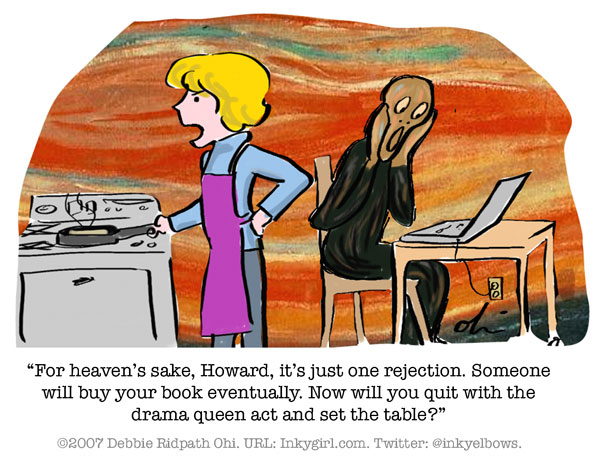
I get a lot of #AskAgent questions about the ol' "Revise and Resubmit" -- so I figure I'll tackle them all here, and if you have more you can put them in the comments.
Q: "I've heard "R+R" or "Revise and Resubmit" - but what does it mean?"
A: It means that an agent has read the author's full manuscript, and while they are not ready to commit to offering representation, they see potential in the author or the story and they are willing to provide notes and an opportunity to, well . . . Revise and Resubmit. ;-)
Q: "How can I tell if the agent is just giving general feedback as they might with any nice personalized rejection, or if they really want to see the book again?"
A: Every agent works differently, but to my mind there are three types of rejections:
*Impersonal - A form letter - might be long or short, but ultimately, there's no feedback, nothing personalized to you specifically, just a kind "not for me, thanks."
*Personalized - Notes you/the book by name - says a nice thing (or a few) about the manuscript, maybe notes a problem (or a few), but is a no all the same.
*R+R - clearly took some time to write, gives extensive notes on the strengths and problems with the manuscript, perhaps there is even a phone call to discuss, and there is an invitation to resubmit explicitly stated.
Q: "But what if I don't agree with their notes, or don't want to revise?!"
Then you say something nice like "thanks for taking the time to write this!"And then don't fret about it. That's fine. Nobody is forcing you to take the advice or to resubmit! (Though you might find that the advice gets better the more you let it settle in your brain... so don't burn the email or anything.)
Q: "How often do you give a "Revise and Resubmit"?
A: They are pretty rare. Of the hundreds of queries I get, I reckon I request about 5% fulls. Then about 5% of the fulls I read will result in an R+R. Some of those people will choose to revise, some won't. Of the ones that do revise, I still might ultimately turn down for any number of reasons . . . but if they've taken the notes on board and done a great job, I'd say they are likely much closer to getting representation if not from me, then from somebody else.
Q: "I've heard writers call R+R's "The Slow No" -- they say this is just a nice way to reject somebody, and there is little chance the agent will change their mind once you revise."
A: This is quite wrong. I do not give extensive feedback unless I really do see great potential in the book, and I do NOT say that I want to read it again if I don't really want to read it again. I mean - no. Never. I just can't spend extra time thinking about or looking at things I don't like, and I wouldn't string anyone along in this way "to be nice" because I don't think it IS nice to string people along!
Q: "But come on, get real, have you ever actually SIGNED somebody after an R+R?"
A: I have signed several authors after an R+R, in fact. These are authors who took the feedback I gave and really ran with it -- not just giving a micro tweak here and there to their manuscripts, but really doing awesome full-on revisions that took their books from "promising" to "OMGAMAZING." I had no idea if these folks could really revise, or would want to revise -- but I am so glad they did, and so proud of them and their books!
Q: "OK but what if we decide to write a totally different book instead. Should we query you again, or avoid since we never did that R+R before?"
A: In my opinion, if I've ever had a full of yours in the past and given any personalized feedback (not just an R+R), and that feedback resonated with you, you should definitely try me again on your next book. I have offered authors rep on the second or even third book they've queried. Sometimes an author's earlier work was good but just not quite there -- but they get better and better, and I am always pleased to see these names again the next time! (That said, if you thought my advice was lousy or something on the first book - you might try another agent at my agency for the next one.)
Q: "You responded to my full two years ago and I still haven't finished the revision. Is there a time limit? How long should this take?"
A: There's no time limit. It takes as long as it takes, and I'd rather you take it slow and do a smashing job than rush and half-ass it. . . don't worry about me, I've got plenty to read. Of course I may check in from time to time to see how it's going -- no pressure, just sometimes it's hard for me to forget about a character! :-) If you think it would help to give yourself a fake deadline, try 4 months. But don't break your neck over it.
Anything I forgot to ask myself on your behalf? Ask away!
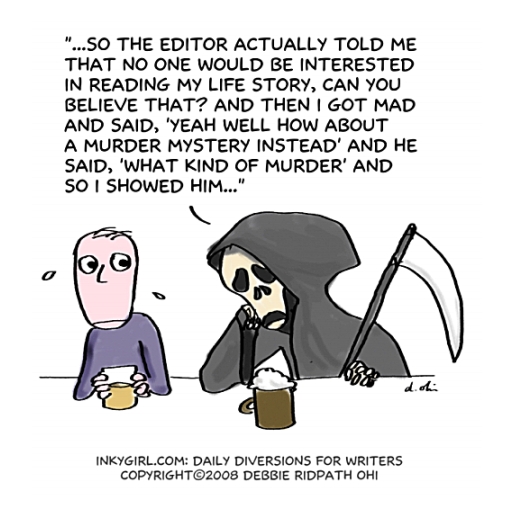
Happy Monday, everyone! I know, I know…Mondays. Bleh. Luckily, Donna Galanti is here to cheer you up. When it comes to publishing, she’s done it all: her short story collection is self-published, her debut novel was published through a small press, and she’s recently acquired an agent for her children’s book series. Today, she’s here to share her journey to traditional publication—the lessons she learned and is still learning as a published author. So be encouraged, everyone. IT CAN BE DONE!

Courtesy of Mark Sebastian @ Creative Commons
Over three years I traveled a writing road to become published. It was challenging, and every step (forward and backward) led me to an agent, a publisher, and a 2-book deal. If you want to become traditionally published, I hope my journey helps you realize that it really does all start with one step, and ALL these steps will benefit you once you get that book deal.
1 step to get out of the comfort zone
Three years ago I crawled out of my writer’s cave and met other writers. I attended workshops, conferences, and networking events. I challenged myself to take a class on how to write in a different genre. Writing is impulsive. Be impulsive and take risks to get outside your comfort zone.
Are you ready for discomfort? Once you have a book deal…you’ll be asked to sign at book expos, present at conferences, do author panels, write blog posts, or present at school assemblies.
2 years submitting to 189 agents
I spent years submitting to agents. Be ready for rejection and combat it with more submissions. Your query letter is your sales tool to get an agent to ask for the full manuscript. Keep getting rejected? It’s time to revise that letter. New agents are prime for querying as they all want to build their client lists. I recommend following the Writer’s Digest Guide to Literary Agents. My friend and agent, Marie Lamba, has a great advice column on getting an agent here on her Agent Mondays.
Are you ready to keep pitching? Once you have a book deal…your agent may need to spend months pitching your book to publishers, and you await more rejection until it finds a home.

Courtesy: Nic McPhee @ Creative Commons
3 rounds with my developmental editor and 3 beta readers’ feedback
Spend the money and use a developmental editor. Frustrated that my manuscript was being rejected, I knew something wasn’t working. My editor at Writing Partner helped me see what I needed to do (three major rewrites over two years) and apply what I’ve learned. Here are 5 things I learned from my editor. Find the right beta readers who know how to decipher fiction and read the genre you write in. Give them a list of questions to help guide them.
Are you ready to take criticism and apply it to make your work better? Once you have a book deal...you will work with an editor at the publishing house, or your agent as an editor. They will request changes – and expect you to know how to fix them. Will you know how? Be open to changes. Read my friend Kathryn Craft’s editing journey in regards to her book deal.
4 (and a half) months waiting for an offer
It takes a long time to hear back from agents and publishers who have your manuscript under consideration. While you wait, keep revising and submitting your work and getting feedback. Study the publishing market. Get free e-newsletters to Publishers Weekly and Publishers Marketplace. Read in your genre. Purchase books on how to write. See my writing resource list here. And keep coming up with new book ideas. Why? Because an agent doesn’t just want you for a one book deal, they want you for a long term relationship. When you get a call from an agent, they will want to know what other projects you’re working on. Have those ideas shaped into short pitches. I had mine on hand to seal the deal.
Are you ready to think about agents the same way? Once you have a book deal…On your new career path you need to prove you are serious about being an author, that you know your genre, and youre self-motivated to create a portfolio of writing. You want an agent who will guide and champion you. Research them before querying and talking with them and have your own interview questions ready. Here’s a great article I referenced before talking with my agent.
5 writing conferences and 5 novels read in an internship
As a writer you need to learn the writing craft, the business of writing, and how to build relationships in a writing community. I’ve been lucky to have met many folks through the Philadelphia Liars Club and their Writer’s Coffeehouse. Through an agent friend there, I was offered an internship with the Jennifer De Chiara Literary Agency. In this role I evaluated manuscripts. I learned how to deconstruct a novel. And I learned to see similar problems in my own writing and how to avoid them. I’ve also befriended many bestselling authors, online and at conferences, who want to help new writers. They’ve advised me, allowed me to guest post on their blogs, and have written blurbs for my work. They pay it forward. Someday you will too.
Are you ready to keep learning from your peers and apply what you’ve learned? Once you have a book deal…you will be elevated as a writer in a new partnership that requires you to be professional and knowledgeable in your craft – and you need to continue networking to build those valuable relationships that will boost your career.
6 in-person agent pitches
I’ve pitched my book to agents at conferences and at social gatherings. Think of it as a conversation. Agents need writers as much as we need them. Always be ready to talk about your book. Always have a business card on hand and ask for theirs in return.
Are you ready to pitch at a moment’s notice? Once you have a book deal…you will be promoting your book everywhere, formally at signings and informally in the grocery store. Have your book’s one-line pitch ready to share with that potential customer. Remember, YOU are the one person most passionate about your book.
7 months to write the first draft
I almost gave up. Remember, I challenged myself to write in a new genre? It was hard. I didn’t always enjoy it. I felt outside my comfort zone, but I gave myself a deadline to finish, and I stuck to it. And here are six things I learned about writing a children’s book during this process.
Are you challenging yourself to finish your book on a deadline? Once you have a book deal…you will be expected to meet many deadlines. You will be given an editorial calendar and go a few editing rounds on the manuscript, each time with a deadline. Got a two-book deal? You will be given deadlines to deliver a manuscript proposal and the manuscript on book two. You will have deadlines to meet for blog tours and other events. Keep a good reputation and make deadlines.

Courtesy: Sean MacEntee @ Creative Commons
8 agents who had the full manuscript and rejected it
The biggest reason agents rejected my book? They didn’t like the voice—and that’s a personal choice. Your voice is your natural, unique expression. Wait for that someone who will love your voice. It can be the agent that helps you launch a career, like my agent, Bill Contardi with Brandt & Hochman. It can be the publisher, like Month9Books, who fell in love with my middle grade novel. If they love your voice in one book, they most likely will love it in others you write.
Are you ready to take rejection and keep persevering? Once you have a book deal…your changes to the story may be rejected. Your title may be rejected. Your next book idea for the second book in the deal may be rejected. Get used to rejection and think of it as positive traction.
And now it all comes down to one. One agent. One publisher. One deal.
I spent years preparing to publish my book and when it happened, it happened fast. Within a month I had an agent, a publisher, and a two-book deal. But look at the number of steps (and missteps) I took along the way to get to that ONE. Going through all these steps may be disheartening at times, but doing so prepares you to step into the authorial role and work with your agent to build a career. Because you will encounter these same steps as a published author.
Are you ready to take these steps again? And again?
What’s my next step? The challenge of transitioning my brand from an author of dark adult fiction to children’s fiction. That may be a post here for another time–once I figure it out. ☺
 ABOUT DONNA:
ABOUT DONNA:
Donna Galanti writes suspense, young adult, and middle grade fiction and is represented by Bill Contardi of Brandt & Hochman Literary Agents, Inc. She is an International Thriller Writers (ITW) Debut Author of the paranormal suspense novel A HUMAN ELEMENT (Echelon Press) and its sequel, A HIDDEN ELEMENT (Imajin Books), which releases summer 2014. Book one and two of her middle grade series, JOSHUA AND THE LIGHTNING ROAD, debuts in 2015 (Month9Books). She lives in Pennsylvania with her family in an old farmhouse that has lots of writing nooks, fireplaces, and stink bugs but sadly no ghosts.
Visit her at:
www.donnagalanti.com
Twitter
Facebook
Goodreads
The post Eight Steps to an Agent, a Publisher, and a Two-Book Deal appeared first on WRITERS HELPING WRITERS.

By:
Danette Haworth,
on 3/18/2014
Blog:
Summer Friend
(
Login to Add to MyJacketFlap)
JacketFlap tags:
children,
Walker,
lucky,
luck,
Goodreads,
rejection,
free book,
lottery,
Bloomsbury,
Orlando,
middle,
Danette Haworth,
Abrams,
grade,
Cantor,
A Whole Lot of Lucky,
Stacy,
starred Kirkus,
title development,
Add a tag
Titles--heartache city! The title must do everything a synopsis or query does: grab the reader, provide a summary, and hint at the action yet to come. A lot of time goes into working up a good title, and it's not just the author's work, either. The editor, the editor's coworkers, and sales and marketing all have their say; everyone's input must be considered.
Titles cooked up and rejected for A WHOLE LOT OF LUCKY:
- Two Flavors of Lucky
- The Year of My Magnificent Luckiness
- Three Million Dollar Girl
- The Duplicitous Luckiness of Hailee Richardson
- Serendippitydoo
- Lucky Me
- Impossibly Possibly Lucky
- Hailee Richardson, Girl Millionaire
My editor and I brainstormed pages of titles and promptly rejected most of them. The problem lies in the word "lucky:" phrases involving "getting lucky" are imbued with the wrong kind of nuance! Also, we wanted to avoid words like jackpot or other buzzwords that are too close too gambling. (This was hard, because even the buying of a lottery ticket is gambling.)
My sister suggested "A Whole Lotto Lucky," and the powers that be loved her suggestion! With a bit of morphing, my sister's words became A WHOLE LOT OF LUCKY.
Now you can try your luck without all the heartache my editor and I went through! For a free, signed hardcover of A WHOLE LOT OF LUCKY, just enter the Goodreads contest!

By: Kathy Temean,
on 3/9/2014
Blog:
Writing and Illustrating
(
Login to Add to MyJacketFlap)
JacketFlap tags:
authors and illustrators,
How to,
demystify,
The First Five Pages,
Formatting your manuscript,
Staying out of the Rejection Pile,
Writing Tips,
Book,
reference,
inspiration,
Advice,
Noah Lukeman,
rejection,
Add a tag
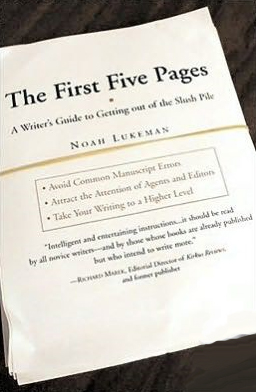 We’ve been talking a lot about how to format your manuscript, so I bought The First Five Pages: A Writers Guide To Staying Out of the Rejection Pile by Noah Lukeman to see what other things might be good to share and already he has reminded me of things I forgot to mention to you that you should do before submitting.
We’ve been talking a lot about how to format your manuscript, so I bought The First Five Pages: A Writers Guide To Staying Out of the Rejection Pile by Noah Lukeman to see what other things might be good to share and already he has reminded me of things I forgot to mention to you that you should do before submitting.
He says, “There are no rules to assure great writing, but there are ways to avoid bad writing.” He also points out that agents and editors don’t read manuscripts to enjoy them; they read solely with the goal of getting through the pile, solely with an eye to dismiss a manuscript.
So obviously, we want to do everything to look good and make our first contact a professional one. We want to make sure our manuscripts do not signal carelessness, sloppiness, ignorance, or defiance of the industry’s standards; that the writer doesn’t care enough to do the minimum amount of research to make a manuscript industry presentable. An editor or agent will assume that the careless presentation continues in the manuscript.
Avoid rejection in the first few minutes by making sure your manuscript is presented properly:
Paper: 8 1/2 x 11 inch standard 20 pound bond white computer paper.
Text: 12 pt. Times New Roman font. Printed only on one side of the page.
Clean: Do not send out a manuscript that you have sent out to other agents or editors if it appears the slightest bit worn.
Eliminate: Make sure you do not send out a manuscripts filled with boldface, underlined, capitalized, or italicized words everywhere, unless you purposely want to drive the agent or editor crazy.
Printing: Do not try to squeeze the last drops of ink from your printer and send out dim/hard to see and please if anyone still has a dot-matrix printer, throw it out and buy an ink-jet or laser printer.
Spacing: Double spaced lines with 1 inch margins. New paragraphs should be indented and also dialog should always be indented. Make sure you indent enough spaces (8-10 spaces on my computer). Nothing is worse than trying to read a manuscript when the indentations are so slight it is easy to miss them. Leave a half of a page between chapters. Line breaks between paragraphs scream amateur.
Do Not Include: Artwork or illustrations throughout the pages. It screams amateur. You might feel that adding some clip art helps the editor or agent get a feel for what you book is really about, but it is not professional. If you text needs a picture to explain what is going on, then add an illustrator’s note. Try to keep them to a minimum.
If you are an illustrator and have written and illustrated your book and have a book dummy; make sure you mention this in your query and give a website link where they can visit to see your art. You might want develop a page on your website exclusively to give to editors/agents, so they could view it online. Never send in original art.
Rights: When you present a manuscript to an agent or editor you are offering all rights. Do not put “Copyright” on your manuscript. It makes you look paranoid and besides it is not necessary.
Avoid Overuse of: Question marks, exclamation points, and parentheses. The abundant use of foreign words or phrases. Noah also say to avoid the inappropriate use of fancy words; crude of vulgar language or images; graphic blood and sex, but most of all cliché. Doing this in the first five pages can lead to instant rejection.
I think this covers all of the instant cosmetic rejections. Hope this helps.
Talk tomorrow,
Kathy
Filed under:
Advice,
authors and illustrators,
Book,
demystify,
How to,
inspiration,
reference,
rejection,
Writing Tips Tagged:
Formatting your manuscript,
Noah Lukeman,
Staying out of the Rejection Pile,
The First Five Pages 

I have something BIG going on! Looks like I'm going to Italy. My art that is! I've been selected to be featured in the SCBWI 2014 "
Bologna Illustrators’ Gallery." My piece "Time to Wish" will be displayed on the showcase booth walls at
The Bologna book Fair.
This leads me to thinking about perseverance in this business and the art of never giving up. That's a hard thing to do when you've spent years chasing a dream. Sometimes receiving encouragement, other times rejection. Then more rejection. Then the rejection turns into a no response, because the business practices have changed, and a no response means rejection. (But in the back of your mind you think there still might be hope - maybe they just haven't gotten back to you yet?) Then you get a good critique, a featured spot, or even a rejection letter with a positive note. And you think just maybe you can make this dream happen.
Someone recently gave me some very sound advice. We were discussing the need to look for a paying job or to continue putting everything you've got into following this dream. She asked me "Which one would leave you with regrets?" Years from now would I regret most not taking a menial job or giving up on publishing?
And that leads me to Bologna. I'm not going to give up. I just got a kick in the butt to remind me of what I want and what this particular piece means to me. This piece is from my heart. It's from a story I started a long time ago and "cut my teeth on" in this business. It not the same story it was when I first wrote it (or for that matter first illustrated it.) It has grown along with me. It's been written many times, revised many times, and sent out many times. Then shelved.
I've worked on other things since then. I started new picture book projects, I've illustrated books for other writers, I even started writing a novel of my own. Recently an Art Directer reviewed my portfolio and told me this piece showed how much I loved working on it. So I pulled it out from the dark drawer again, made more revisions and decided it's good. The writing is good. The concept is good. I think I got this. I think it's time to start shopping this story...again.
Please Note: This month's Friday Studio Links has been delayed. Check back next Friday for more information.

By: Genevieve Petrillo,
on 3/1/2014
Blog:
Cupcake Speaks
(
Login to Add to MyJacketFlap)
JacketFlap tags:
kidlit,
reading,
poetry,
writing,
children's literature,
characters,
ideas,
dialogue,
rejection,
picture book writing,
inspirational quote,
12x12,
Add a tag

Today is Dr. Seuss’s birthday. He would’ve been 109 years old. He is the Best Doctor Ever on account of no needles, no looking into ears with a flashlight, no sticks stuck into forbidden places, and no touching of my bits and pieces.

Waiting for the Doctor. Hoping for the Best.
Mom also loves Dr. Seuss for a million other reasons – his wild imagination, his silly rhyming, his crazy stories, and the fact that his first book was rejected 27 times before anybody said they liked it. Misery loves company.

Mom’s #1 favorite Dr. Seuss book is The 500 Hats of Bartholomew Cubbins from 1938.
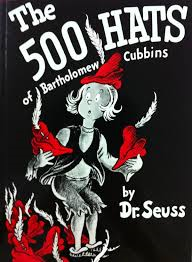
Normally, Mom and I steer clear of anything that smacks of numbers, but counting those hats is so much fun and so suspenseful that we can’t resist it. Also, a hundred years ago, Mom’s 5th grade teacher, Mrs. Nelson read that story to her class and Mom and her friends giggled and counted and were afraid for poor little Bartholomew not being able to take his hat off for the king.
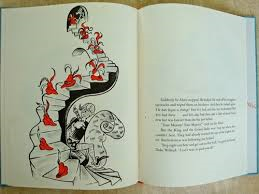
As of Dr. Seuss’s birthday, Mom is up to date on her 12×12 Challenge. She has written 2 new stories in the past 2 months. Now it’s a new month and time to start a new story.

In which direction should she go?
Direction? Up, of course.

King of the Hill of Filth
What will be original?
Original? It doesn’t get any more original than an old dog learning a new trick.

Who will step out of her list of character ideas?
Character? This one.

Or this one.

Or this one.

How will she make the story sparkle?
Sparkle? With a tiara, of course.

Am I sparkling, yet?



By: Genevieve Petrillo,
on 11/3/2013
Blog:
Cupcake Speaks
(
Login to Add to MyJacketFlap)
JacketFlap tags:
kidlit,
pets,
acceptance,
writing,
children's literature,
dogs,
ideas,
revising,
rejection,
picture book writing,
submitting,
Add a tag
Mom and I went geocaching again last week. Geocaching is like treasure hunting. Mom holds the phone that shows the GPS and compass. Then we walk and walk and walk and walk.

Then she decides the phone is upside down, so she turns it around and we start over. We walk and walk and walk and walk some more – the other way.

The phone tells her when we’re getting close, and then we start searching and scanning till we find the treasure.

Sometimes, Mom says, “No acorns.”

and “Don’t eat the pine cone.”

and “Yikes! Hornets!”

Geocaching is fun!

Mom does treasure hunting when she wants to submit a story, too. She has too many stories to count inside her computer and some more inside her head (that’s what’s up in there…). She is sure that one of them is a treasure and will be Book #2. Whenever she reads about a publisher or an agent that seems to be looking for the type of story Mom writes, she starts treasure hunting. She opens up story after story, revises them a little, talks to herself about them, and decides whether she’s headed in the right direction, or needs to turn around and start over.



Mom says, “No garbage.” a lot. I’m not allowed to lick the floor or eat from the garbage pail (I can barely reach it, anyway).

When we walk around the neighborhood or go to the park, I’m not allowed to eat banana peels or sunflower seed shells or pick up empty pudding cups or coffee lids. I’m not allowed to have candy wrappers or eat goose poop or sniff around by the dumpster.

Apparently, garbage is a bad thing. Sometimes, Mom writes a word or a sentence or a story that’s garbage. She doesn’t mince words about it. She says, “This stinks!” and “What am I talking about?” and “Are you eating a napkin?”

Mom is not worried when she writes garbage. She thinks if she “gets the garbage out” the good stuff will come next.
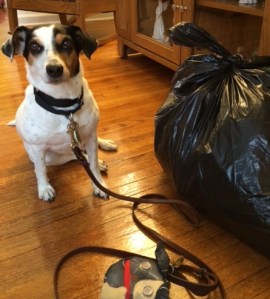
Let’s get the garbage out!
I know this is true because after Mom and I took the garbage out once, we walked around the back of the dumpster, and I found the good stuff! Macaroni noodles!!

Before Mom could say the word, “Leave it,” I ate one!

Garbage. Mmmmm…


.jpeg?picon=3304)
By: Leslie Ann Clark,
on 6/27/2013
Blog:
Leslie Ann Clark's Skye Blue Blog
(
Login to Add to MyJacketFlap)
JacketFlap tags:
cartoons,
Writing,
sketch,
rejection,
illustrate,
how to write,
Kicking Around Thoughts,
artist,
children's books,
Add a tag
Funny words. It suggests that there was something wrong with the first invention something that needs fixing. I suppose that is true. When something isn’t working you should look for another way. You should fix the thing.
I began working on a new set of children’s books. I was hammering away at a story, trying to get something good down in order to illustrate it. Everything was flat. Nothing was working, nothing felt right. My characters were looking at me like I was crazy. They were all yawning! Try writing when your characters are shaking their heads!
It was then that I realized I was going about it all wrong. As an artist, I need to star with the art!!!! …the story would follow.
I sat with sketchbook in hand and began drawing little cartoons. One thing led to another and star was born! I will share more. This is a discovery for me. I will let you know how I make out in the days to follow!
For now, I’ll just keep sketching!
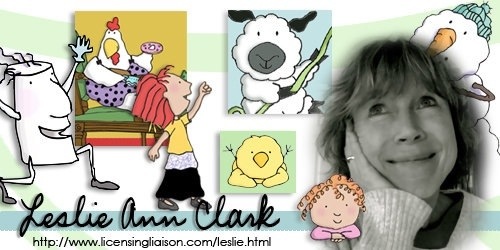
Filed under:
how to write,
Kicking Around Thoughts 

What does it mean if your agent won't send out your manuscript anymore?
http://www.booksandsuch.biz/blog/when-an-agent-gives-up-on-a-project/
The most common reason agents reject a manuscript is it's not in a genre they represent.
http://annerallen.blogspot.com/2013/03/the-1-reason-for-queryfailshow-to-avoid.html
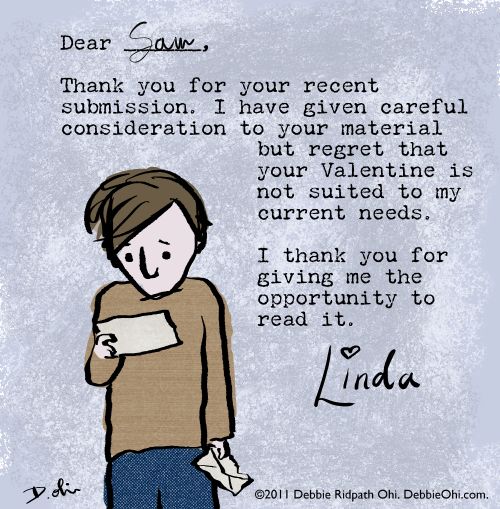
Poor Sam.

By:
Debbie Ridpath Ohi,
on 1/15/2013
Blog:
Inkygirl: Daily Diversions For Writers
(
Login to Add to MyJacketFlap)
JacketFlap tags:
Rejections,
romance,
grammar,
rejection,
ring,
Comics for writers,
henry,
proposal,
modifiers,
Add a tag

By: Kathy Temean,
on 1/13/2013
Blog:
Writing and Illustrating
(
Login to Add to MyJacketFlap)
JacketFlap tags:
News,
success,
revisions,
rejection,
Vanity Fair,
Team of Rivals,
Steven Spielberg,
Tony Kushner,
Daniel Day Lewis,
New York Film Critics Circle Award,
Add a tag
 Even Steven Spielberg can get a rejection letter. It seems that Daniel Day-Lewis—who plays Lincoln in Spielberg’s presidential Academy Award Dominated movie, originally did not want to play Abraham Lincoln. Spielberg didn’t let the rejection letter go to waste, he stowed it away for safekeeping and the letter showed up at the awards-podium as reading material last week.
Even Steven Spielberg can get a rejection letter. It seems that Daniel Day-Lewis—who plays Lincoln in Spielberg’s presidential Academy Award Dominated movie, originally did not want to play Abraham Lincoln. Spielberg didn’t let the rejection letter go to waste, he stowed it away for safekeeping and the letter showed up at the awards-podium as reading material last week.
Julie Miller reporter for Vanity Fair wrote, “Before presenting Day-Lewis with the New York Film Critics Circle award for best actor, Speilberg read aloud the Oscar winner’s thoughtful brush-off.”
Here is Steven’s Rejection Letter:
Dear Steven,
It was a real pleasure just to sit and talk with you. I listened very carefully to what you had to say about this compelling history, and I’ve since read the script and found it in all the detail in which it describe these monumental events and in the compassionate portraits of all the principal characters, both powerful and moving. I can’t account for how at any given moment I feel the need to explore life as opposed to another, but I do know that I can only do this work if I feel almost as if there is no choice; that a subject coincides inexplicably with a very personal need and a very specific moment in time. In this case, as fascinated as I was by Abe, it was the fascination of a grateful spectator who longed to see a story told, rather than that of a participant. That’s how I feel now in spite of myself, and though I can’t be sure that this won’t change, I couldn’t dream of encouraging you to keep it open on a mere possibility. I do hope this makes sense Steven, I’m glad you’re making the film, I wish you the strength for it, and I send both my very best wishes and my sincere gratitude to you for having considered me.
Daniel Day-Lewis
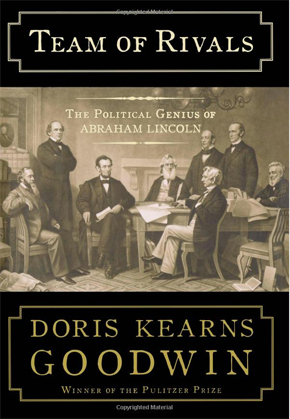 What can we learn from this? Well, Spielberg didn’t give up. After receiving the letter, he recruited Tony Kushner to pen a new screenplay from Doris Kearns Goodwin’s biography of Lincoln, Team of Rivals—one that would earn Day-Lewis’s approval. Apparently he did, because Lincoln is positioned to run away with the Oscars in February.
What can we learn from this? Well, Spielberg didn’t give up. After receiving the letter, he recruited Tony Kushner to pen a new screenplay from Doris Kearns Goodwin’s biography of Lincoln, Team of Rivals—one that would earn Day-Lewis’s approval. Apparently he did, because Lincoln is positioned to run away with the Oscars in February.
So the next time you get a rejection letter, keep this story in mind and revise your manuscript. Revision does improve our work and sometimes we just need someone to pull our best out of us.
Talk tomorrow,
Kathy
Filed under:
News,
rejection,
revisions,
success Tagged:
Daniel Day Lewis,
New York Film Critics Circle Award,
Steven Spielberg,
Team of Rivals,
Tony Kushner,
Vanity Fair 

Today is 12/12. Such a happy day. It’s my Gotcha Day! That’s the day three years ago that Mom picked me out and adopted me and said, “I gotcha. You’re coming home with me!”

I was in a cage, with overgrown nails, bad breath, scabs on my ears, and parasites in my tummy. I was smaller than she wanted and older than she hoped I’d be. But even though I seemed all wrong, Mom saw something in me that would turn out to be just right.

That’s how it works sometimes in life…. And in writing. Mom wrote a nonfiction story for the first time in a long time. It troubled her because she didn’t love it as much as she usually loves her stories. It just didn’t sound the way she had hoped.

She brought it to her writing group named DavidLaurieandOtherDavid. They said her story had overgrown nails, bad breath, scabs on its ears, and parasites in its tummy. …not really, but they made a LOT of suggestions so Mom is practically starting over with it. She’s hoping that even if it seems all wrong , it’ll turn out to be just right.
I think the story will be fine and maybe even amazing when Mom works with it for a while. I mean, look how I turned out!



by Deren Hansen
One of the down-sides of becoming an artisan publisher is that you must forego the luxury of getting rejected by agents and editors.
“A luxury?” you sputter.
Yes. Instead of the gentle buffeting you’ll receive from publishing professionals, who respond with a polite, but vague, “it’s not a good fit for us,” you’ll get slapped around by readers who have no qualms about telling the world they think your book is a piece of crap.
As hard as it may be to believe, rejections from agents and editors offer several layers of comfort:
- They readily acknowledge their opinions are subjective and that perhaps someone else will like it.
- There’s always the opportunity to revise: when you submit a manuscript to an agent or editor, you do so knowing they will generally ask for revisions.
- Agents and editors are always open to future submissions. Even if the piece you’re shopping now isn’t right for them perhaps your next one will be.
Compared to that, readers have no mercy.
- Most readers believe their opinions are objective, or at least representative: if they didn’t like your book, why would anyone else.
- Readers expect a finished product. If they don’t like your first version, they’re not going to read your book a second time no matter how much you revise it.
- Readers hold grudges. If they hate one book, they’ll hate the rest sight-unseen.
If you’ve turned to artisan publishing because you’re tired of rejection you’ve come to the wrong place. Electronic publishing does let you bypass the gatekeepers who in the past might have kept you out of the market altogether. But the price for that access is that you also bypass the safety net those gatekeepers provide. If you’re not careful, you open yourself up to getting rejected for everything from typos and grammar errors to characters and stories that don’t resonate with readers.
Offering your work directly to readers requires more courage and a thicker skin than letting a publisher bring out your book. If you have a publisher and your book fails in the marketplace, you can always take consolation—whether it’s true or not—in blaming them. If you publish your own work, you’ve got no one to blame but yourself.
If you can listen to readers rant that your loathsome book defiled the electrons used to store and transmit it and that the author should be hunted down and forbidden from ever putting pen to paper, and then return to your writing with full confidence and vigor you’ve got what it takes to become an artisan publisher.
Deren Hansen is the author of the Dunlith Hill Writers Guides. Learn more at dunlithhill.com.
Finding the Sweet
Write what you want to write,
say the editors.
Write what you love,
say the editors.
I write.
I love this!
Well, say the editors, it lacks a plot.
OK.
I write what I love and
make sure it has a plot.
A good ‘un.
(Hey, I’ve studied Hunger Games,
and the Edgar winning mysteries;
I know a good plot
when I read it.)
I love this!
Well, say the editors, the voice doesn’t grab me.
OK. I write what I love and
make sure it has a plot and
make sure the voice is unique, compelling.
A good ‘un.
(Hey, I’ve studied the Newberys,
the Caldecotts, the Alexes,
the Sieberts,
the Edgars, and so on.
I know voice when I hear it;
and I know how to create it.)
I love this!
Well, say the editors, the plot
is great;
the voice
is great;
but I don’t really connect with the characters enough.
OK. I write what I love and
make sure it has a plot and
make sure the voice is unique and
make sure that the characters are connectable.
A really good ‘un.
(Hey, by now, I’ve read all the New York Time’s
Bestsellers, the National Book Award winners,
plus any other @#$#$@ novel
that anyone ever recommends.
I know a good book when I read it–
or write it.)
Hey, I really love this!
Well, says the editor, you got everything right:
plot, characters, voice–
but it’s too quiet.
Where, oh where is that sweet spot?
And how can I write something else
that I love,
knowing that
no one else will love it?
Where is that sweet editor?

A Sweet Spot.

 During the conference I attended last week, I must have asked thirty people how their editor and agent “pitching” appointments went.
During the conference I attended last week, I must have asked thirty people how their editor and agent “pitching” appointments went.
Many of the writers were told to go ahead and submit their full manuscripts. Joy!
Even more, though, had flaws and mistakes pointed out in their summaries and synopses…things that needed to change before the story would be considered.
Constructive Criticism
The flaws included such fixable things as:
- the manuscript was 20,000 words too short for the genre
- the manuscript was told from an unworkable POV
- the plot sagged instead of rising to a recognizable climax
- the historical setting didn’t sound authentic
Reactions and Responses
What I found most interesting were the writers’ responses to the news that their manuscripts had flaws that needed work.
They included many reactions:
- Some denied that there was any big need for revision. They decided to ignore the editor’s or agent’s comments. Every writer except one was an unpublished writer too, so I’m not sure what they were basing their denial on.
- Some writers admitted that the flaw was there–a few had already guessed it–but they took the news so personally that their self-esteem was flattened. They left the conference depressed–not a good state for revising.
- Some defended their mistake or flaw. One writer who had pitched an idea for a genre that the editor didn’t publish argued that they should! She defended her choice of publisher, claiming that they needed to think outside the box.
The Solution
Yes, it’s hard to hear that your idea needs a major overhaul to be publishable. None of us enjoys hearing that. What’s the answer? Eric Maisel in Fearless Creating says this:
“What are any of us to do? Abandon the work or complete it, learn from the experience, cry, forgive ourselves, and move on…Now dry your eyes. There’s work to be done.”
Yes, it’s true that editors, agents and publishers can be wrong. We love to hear such stories of rejected manuscripts that went on to publication (with no change) and hit bestseller status–even becoming classics.
However, says Nava Atlas in The Literary Ladies Guide to the Writing Life:
“There are certainly many other instances in which writers refuse to take any constructive criticism and cling to the notion that their freshman efforts are brilliant and beyond reproach. This creates a ‘me versus them’ mindset that’s never constructive.”
What if you’re willing to fix your writing mistakes, but you don’t know how? What if you freeze or block at the revision an agent or editor has requested? These words from award-winning Elizabeth George in Write Away might point the way for you:
“Why do [writers] reach sudden dead ends? Why do they become afflicted by the dread writer’s block? I believe it’s because they … don’t have enough craft in their repertoire. Put another way, they have no toolbox to root through to repair a mistake in the house they’re trying to build.”
You may not have the right tools in your toolbox, but you can get them. (Example: if your problem is the story lacking conflict or a climax, study books on plotting until you figure out the problem.)
How About You?
I’m curious. What do YOU do when you get the “fix this” message about your fiction?
Do you have any tips or special survival strategies for this?
View Next 25 Posts













 We’ve been talking a lot about how to format your manuscript, so I bought The First Five Pages: A Writers Guide To Staying Out of the Rejection Pile by Noah Lukeman to see what other things might be good to share and already he has reminded me of things I forgot to mention to you that you should do before submitting.
We’ve been talking a lot about how to format your manuscript, so I bought The First Five Pages: A Writers Guide To Staying Out of the Rejection Pile by Noah Lukeman to see what other things might be good to share and already he has reminded me of things I forgot to mention to you that you should do before submitting. 




























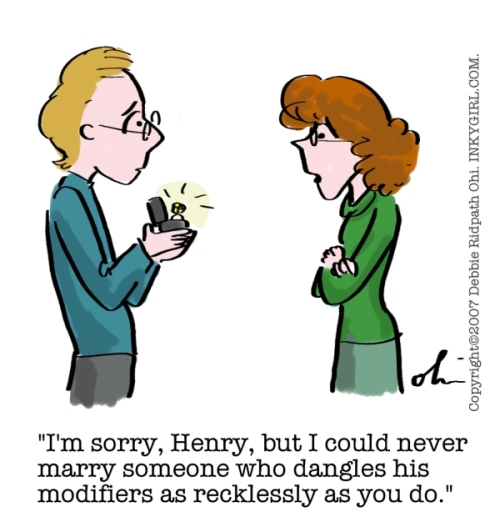
 Even Steven Spielberg can get a rejection letter. It seems that Daniel Day-Lewis—who plays Lincoln in Spielberg’s presidential Academy Award Dominated movie, originally did not want to play Abraham Lincoln. Spielberg didn’t let the rejection letter go to waste, he stowed it away for safekeeping and the letter showed up at the awards-podium as reading material last week.
Even Steven Spielberg can get a rejection letter. It seems that Daniel Day-Lewis—who plays Lincoln in Spielberg’s presidential Academy Award Dominated movie, originally did not want to play Abraham Lincoln. Spielberg didn’t let the rejection letter go to waste, he stowed it away for safekeeping and the letter showed up at the awards-podium as reading material last week.  What can we learn from this? Well, Spielberg didn’t give up. After receiving the letter, he recruited Tony Kushner to pen a new screenplay from Doris Kearns Goodwin’s biography of Lincoln, Team of Rivals—one that would earn Day-Lewis’s approval. Apparently he did, because Lincoln is positioned to run away with the Oscars in February.
What can we learn from this? Well, Spielberg didn’t give up. After receiving the letter, he recruited Tony Kushner to pen a new screenplay from Doris Kearns Goodwin’s biography of Lincoln, Team of Rivals—one that would earn Day-Lewis’s approval. Apparently he did, because Lincoln is positioned to run away with the Oscars in February. 




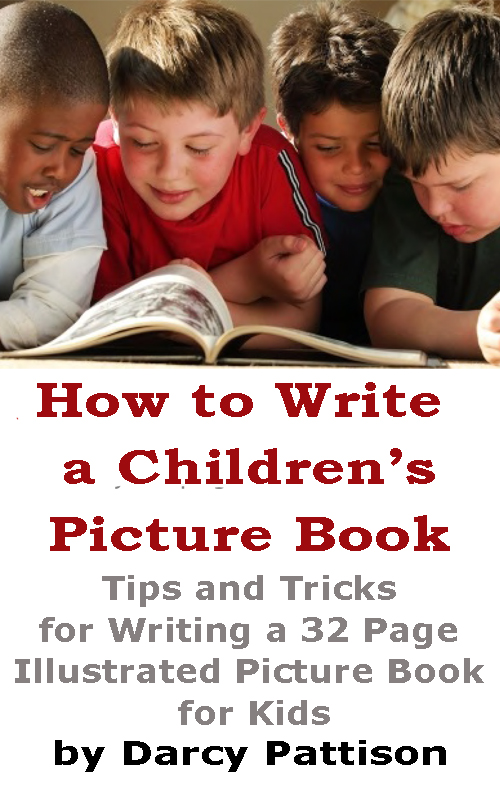



With many agents requesting queries and partials pasted into an email, formatting goes out the window, especially when sending from a Mac to PC computer. Any suggestions?
Barbara, I think when you get a request to paste copy into an email, you don’t have to worry about the formatting. The requesting agent/editor expects that it may be a hot mess. They just don’t want the worry of getting a virus from an attachment.
I’ve read all the picture books but need to get back on the MG and YA fiction wagon! I feel like I’ve been reading a lot, but haven’t read these. A first world problem is too many good books to read.
Thanks, Tracey. From what I’ve been reading when sending sample writing in the body of an email, choose Plain Text rather than Rich Text format. Less issues on the receiving end.
I’ve read this Noah Lukeman book; it has solid advice, much like all his other books.
Excellent information. Thank you!
Coincidentally, I read a few chapters of this book at the library while waiting for my daughter yesterday. Thanks for filling in some of the info I didn’t get to read.
I’ve read Noah Lukeman’s book too.